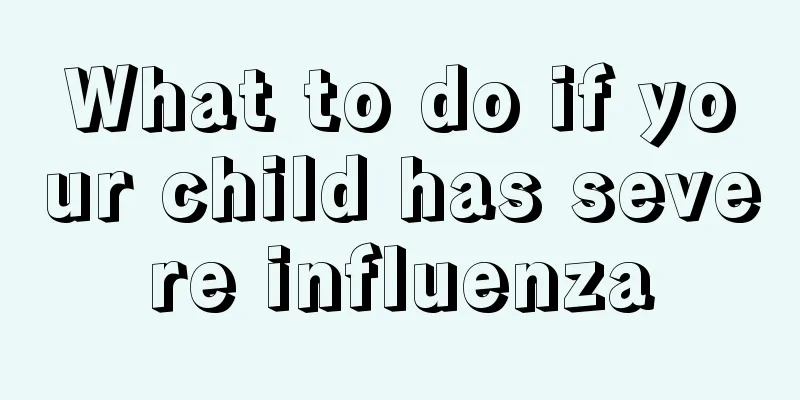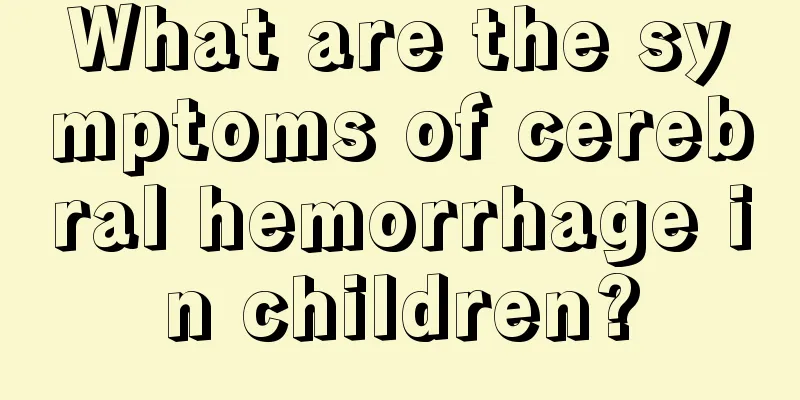What to do if your child has severe influenza

|
In the cold winter, many parents don’t want their children to go out to play, because children’s immunity will be relatively low in winter, which can easily cause children to catch the flu. When a child has a high fever and general weakness, it means he has contracted the flu. He must be treated promptly at this time. If the child has severe flu, it may also lead to pneumonia. Now let’s talk about what to do if a child has severe flu. 1. Go to the hospital for diagnosis The diagnosis can be confirmed by testing nasopharyngeal secretions. If the test is positive, it means you have influenza. Remember, a routine blood test is useless at this time. 2. Oral oseltamivir antiviral treatment Clinically, oseltamivir is used to treat and prevent influenza A and B. When used for treatment, it is only effective if used within 48 hours after the onset of flu symptoms; when used for prevention, it is only used for people who have close contact with people suffering from flu. Oseltamivir can be safely used in children over 1 year old. In 2012, the U.S. Food and Drug Administration (FDA) approved oseltamivir for use in babies over 14 days old. It should be noted that oseltamivir is completely ineffective against other viral infectious diseases such as hand, foot and mouth disease and gastroenteritis, and cannot replace the preventive role of influenza vaccine. 3. Do not give your baby other antiviral drugs or antibiotics without authorization Although influenza is contagious and more serious than the common cold, it is also essentially a self-limiting illness. In other words, most influenza patients can recover on their own. Therefore, the purpose of taking medication is to relieve symptoms and prevent complications (for example, laryngitis, tracheitis, bronchitis, bronchiolitis, pneumonia and gastrointestinal symptoms, etc.). Taking other antiviral drugs without knowing the truth will only increase the risk of side effects and will not produce any significant effects. Taking antibiotics is even more unreasonable. Antibiotics are designed to kill bacteria, but you expect them to kill viruses. This will not only cause bacterial resistance and adverse reactions, but will be of no help in treatment. Ways to prevent flu: 1. Ventilation The influenza virus is mainly transmitted through droplets, so it is most effective to ventilate the home regularly for half an hour each time, preferably two to three times a day. 2. Clean your mouth and nose After coming back from outside, you must disinfect yourself first, that is, clean your mouth and nose, because when we come back from outdoors, we will bring some bacteria or viruses. Rinse your mouth with salt water, clean your nasal cavity with a saline cotton swab, and reduce close contact with your children. 3. Hand hygiene Be sure to wash your hands after coming back from outdoors, and then contact your children after washing your hands to reduce infection to your children. 4. Isolate patients There are patients with respiratory infections in the family. You must separate from your children. Of course, if the mother is sick, the child cannot be separated. Then you need to wear a mask to reduce the probability of droplet transmission. 5. Diet During the peak period of influenza, children must drink plenty of water to increase their body's metabolism. The diet should be light, especially during the acute phase of the disease when the fever persists. Children should be given less protein such as meat and eggs. Give your child a vegetarian, vegetable, or semi-liquid diet. 6. Vaccines From the perspective of the hospital and the doctor, children are encouraged to receive meaningful vaccines, such as the 13-valent vaccine, the 23-valent pneumococcal vaccine, etc., which can prevent some more serious diseases. 7. Exercise We encourage children to play outdoor sports when the weather is nice. Because it can increase the stimulation of the respiratory tract to cold air. |
<<: What is the disease of children's swollen gums?
>>: What are the causes and symptoms of headaches in children?
Recommend
What should a 3-year-old baby eat if he is zinc deficient?
What should a 3-year-old baby eat if he is zinc d...
What to eat is good for children's heart
The heart is an important organ of the human body...
What to do if your child loses hair while breastfeeding
Breast milk is the main source of nutrition for b...
What does phimosis look like in children? I understand everything after reading it.
Many people don’t know what phimosis looks like i...
What are the symptoms of facial paralysis in children?
In life, everyone must be familiar with the term ...
What to do if your seven-month-old baby coughs
Now many parents have reported that their childre...
Can a child's gene mutation be treated?
From a scientific point of view, gene sequences a...
What to do if your child always sniffs his nose
If children always sniff their noses, it is actua...
4 month old baby drooling
It is normal for children under one year old to d...
What causes allergies in children? These reasons are the most common!
Allergies are very common. Young infants and chil...
What to do if your child has anorexia
Anorexia in children is a situation that our pare...
What to do if your child is allergic to milk powder
Some children are repellent to milk powder, which...
What to do if your child has anorexia
Many children suffer from picky eating and anorex...
Can nine-month-old babies eat kiwi fruit? What are the benefits?
Around 4 months old, babies begin to gradually ea...
Reasons for a baby's big belly
When many babies are born, parents will find that...









